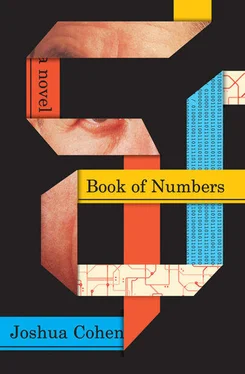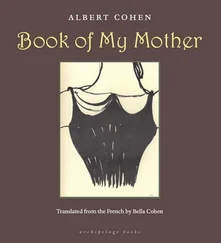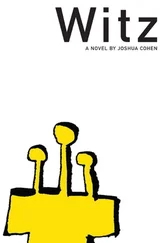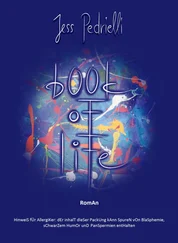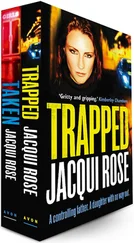://
1984 was a dystopia. Life had become confusing, especially in the suburbs. There were simultaneously too many options, and too few. Everything was the same and different, at once. The supermarkets had every food and drink conceivable, but Cohen’s home had only certain foods and certain drinks, and his parents shopped at only specialty health stores. The candy Cohen was not permitted to consume came in more varieties than the fresh produce from his parents’ garden, but then the fresh produce had more vitamins than the candy did, which despite its branded array all contained the same ingredients, refined. To further confuse things, if the ingredients of an apple were just apple, it didn’t make any sense that his parents differentiated between organic and nonorganic varieties, or that apples were retailed with labels stuck on them alerting to pesticides and waxy preservatives. Water, the substance within, became particularly perplexing, because it came from the tap until it was delivered in jugs, which were initially plastic, then metal. Television and movies proved bewildering too, in that the same things didn’t just happen in different movies and shows but also in different episodes of the same shows, the same plots were always recycled, and during every commercial break the same sports drinks madness recurred. All the shows and movies began wildly enough — teenagers played with matches, snorted drugs, and appeared to enjoy doing both — but then they’d all end tamely, caged, contained in the frame, and even if the teens died tragically they’d return for a lesson, out of character and after the credits, telling their peers don’t pay attention to pressure, stay away from firearms, pederasts, drunk drivers, just say no, and notify an adult.
Sari wanted her son to attend private school, Abs wanted his son to attend public school. But not just that, Abs wanted his son to become a bar mitzvah, Sari wanted her son to avoid that[, calling the practice “a spiritual circumcision”][CAN’T RECALL: DID PRINCIPAL EVER HAVE AN INITIAL — PHYSICAL–CIRCUMCISION?]. Deliberations ensued. The costs were high, in drama and financials. Palo Alto High School[, staffed by PhD washouts from Berkeley,] would be forsaken for the coeducational, awardwinning [WHAT AWARDS?], $10K/year Harker School, whose infirmary was run by a Yale/Harvard MD DrPh, and whose track & field squad was coached by a medallist in the men’s 400m dash at the Munich Olympics. Which meant that instead of a weekend in middle June hosting the usual round of gaming — the forbidden Karate Champ, Kung-Fu Master, Montezuma’s Revenge, Drugwars, Dunjonquest, Wizardry, but also 1K Chess, and Tetris — it hosted instead the ungameable Sabbath.
The Torah, like a computer’s memory, is divided into compartments, parts, one to be read for each weekend of the year. Cohen read from the portion called Shelach Lecha, though he didn’t read from the scroll itself, but from a book. Rather, he didn’t read at all, but had memorized the verses phonetically from a cassette recording prepared by Lay Cantor Tawny Fienberg of Congregation Beyt Am. Though the Torah is divided into portions, one to be read for each weekend of the year, the divisions aren’t marked in the scroll itself, and neither do the verses feature any punctuation. It was the rabbis who compiled the Talmud who established, yet refused to physically separate, the sections, and so consubstantially commanded the reader, who reads aloud, with mentally tracking all classes and clivities of that separation, from section breaks and sentence breaks to, within the sentence, the pauses of phrases. The units the rabbis defined became referred to by their incipit, or opening clauses, and even today Cohen can remember the opening clause of his and chant it with the traditional cantillation: veyidaber adonay el Moshe leymor, shelach lecha anashim, veyaturu et eretz Canaan .
Cohen didn’t study for his admission exam to the Harker School[— on which he attained a score more perfect than anything achievable in Tetris — ], but he couldn’t help but study for the bar mitzvah: Hebrew was the first subject that gave him trouble, and he could never decide whether it was that trouble or the language itself that fascinated[, and kept him from coding modifications to Tetris that allowed two elements to fall at once, that allowed two elements to fall at different speeds, that previewed the next two or more to fall and allowed the player to exchange them, and that expanded and contracted the playing surface both vertically and horizontally, and flipped it 360°, both by player whim and parametrically]. To be sure, Cohen wasn’t frustrated by the Hebrew language, but by its alphabet. Cohen never learned to read, speak, or write Hebrew fluently, and certainly never learned any grammar. His interest and experience were cut from semantic context, purely characterological. While bar mitzvah preparation required an emphasis on the letter as phoneme, to be reproduced orally, subsequent to that event the graphic or glyphic aspects prevailed, an approach that denied the letters their aggregation into syllables, the syllables into words, and favored instead their pictogrammatical or ideogrammatical identities, as if Hebrew were an Asian language in which each sign was a pantomime of arms and legs, ascenders and descenders, bars and stems and ties, in kabbalistic permutation. This pursuit of a symbolic or representative Hebrew was what inspired Cohen to develop his own written language, an unpronounceable language that would never be named, but that would serve as his sole mode of expression for an entire year after his bar mitzvah, until the summer of 1985.
[GET PRINCIPAL TO ELABORATE ON HIS MOTHER’S BOYCOTTING OF HIS BAR MITZVAH.]
[GET PRINCIPAL’S FATHER’S REACTION.]
Cohen’s initial impulse in creating his own language was to avoid what he considered the central paradox of all languages, both human and computational.
This paradox could be expressed in two ways:
1.) In human language an increase in the number of characters (or letters) means a decrease in the size of their utile aggregates (or words), until an alphabet gets so large that to be utile its letters must have their functions foreshortened, and returned to the primacies of the glyph, whose basic constituent is the stroke. English has an alphabet of 26 letters, and the average wordlength is an unwieldy 4.5 letters, while the Asian languages each have hundreds of characters that function as standalone pictograms (images of the things they mean), standalone ideograms (images of the ideas they mean), and thousands if not hundreds of thousands of pictoideo combinations and phonetically radicalized aggregates.
2.) In computer language the opposite of all this is true, in that a decrease in the number of characters (the On or 1 and Off or 0 of binary code) means an increase in the size of their aggregates (strings or lines), so that though any given computer program must be made of millions or billions of positive integers separated by negativities in one unrearrangeable sequence, what is rendered is perfect, and perfectly understandable.
Human language sought precision, BUT became less widely translatable . Computer language found precision, AND became more widely translatable .
Cohen’s father’s coding meant nothing to Cohen’s mother, while his father couldn’t understand his mother’s specialist linguistic jargon — this resulted in “strife.” Things only got worse if they had to give directions, on masstransit, in Spanish.
Cohen was appalled by the fact that human processing unlike computer processing was not and would never be universally standardized. He resented that human languages could merely describe a program, they couldn’t execute one, and had to resort to metonymy, analogy, simile, metaphor.
Читать дальше
